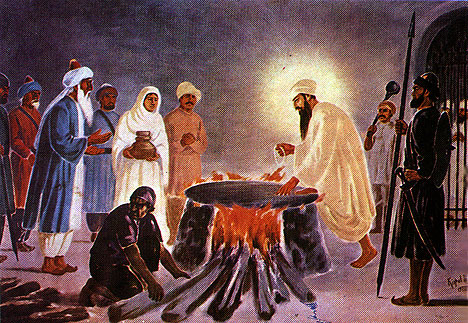|
Sri Guru Arjun
Dev Ji (The Gurus)
Guru Arjan Dev Ji (1563 - 1606) Guru Arjan (1563 - 1606) was in his teens when he was given the Gur Gaddi. He developed Amritsar as a centre of industry and culture for the Sikhs. He requested Mian Mir - A Muslim divine - to lay the foundation stone of the Har Mandar (Temple of God). The temple was built on a level lower then the surrounding land, in the middle of a beautiful lake. This is now known as the Golden Temple. In order to put the township on a sound basis, the Guru helped the establishment of new trades and professions. Amritsar was centrally situated and there was enough scope for commercial realtions with neighbouring countries. The Sikhs were sent to Afghanistan and Central Asia for buying good horses. The trade in horses gave Sikhs a taste for ridind and horsemanship. Guru Arjan felt that the Sikhs should have their own scripture. He collected the hymns of the first four Gurus and of Indian Bhagats and Bhatts. He dictated the hymns including his own to Bhai Gurdas and completed the compilation of the Adi Granth the first book in 1604. Guru Arjan was a man of the people and wielded great influence. His growing power and prestige aroused the jealousy of Emperor Jahangir. Even Muslims came to the Har Mandar. Jahangir resolved, to use his own works, "to put an end to this traffic." He asked Guru Arjan to change the text of part of ths Granth to include the praise of the prophet Mohammed. The Guru refused to do so. In the meantime, Chandu - the Diwan - who bore a grudge against the Guru - poisoned the mind of Jahangir with all sorts of false stories. Jahangir placed Guru Arjan in the charge of Chandu. The latter perpetrated tortures like pouring boiling water on him, throwing burning sand on the Guru. Guru Arjan bore all these tortures with great resignation. After nominating his son Har Gobind as his successor, the Guru was taken to the river bank. His body was then thrown into the river as a final torture. He is the first martyr in Sikh History. |
